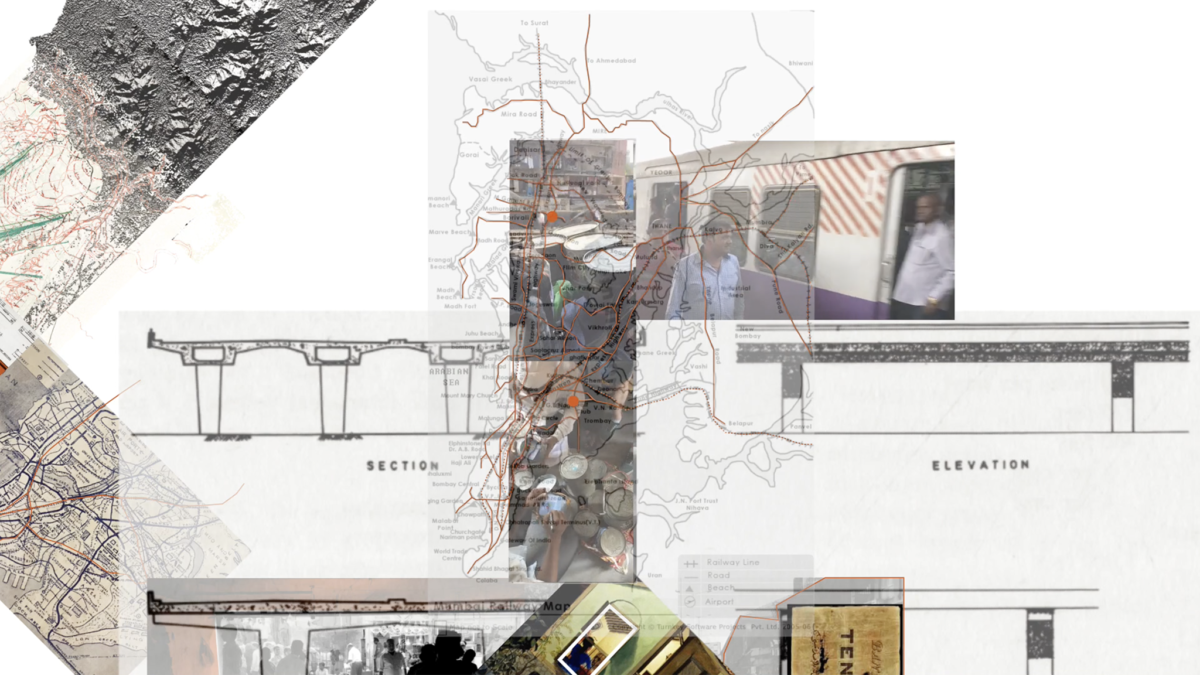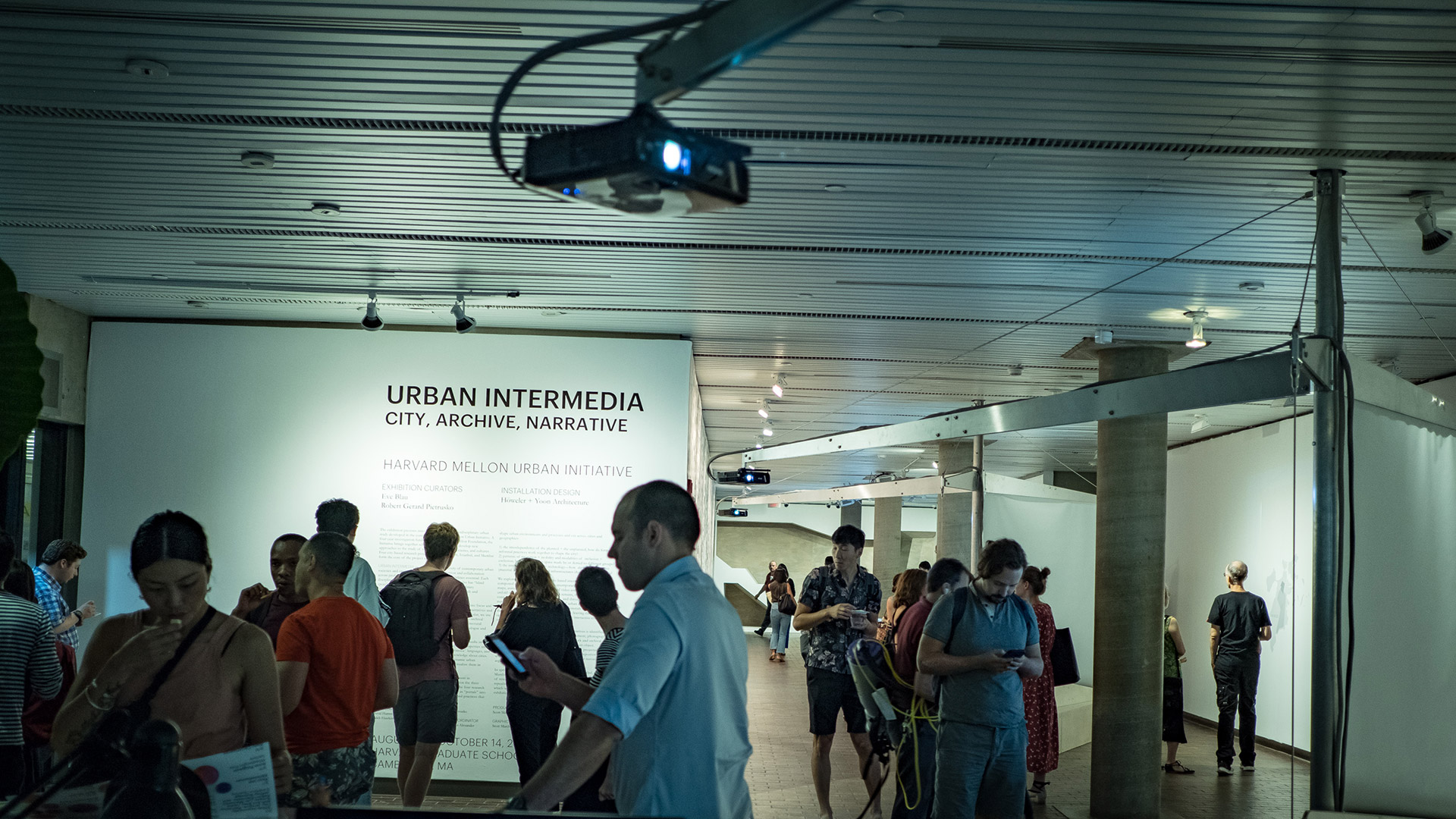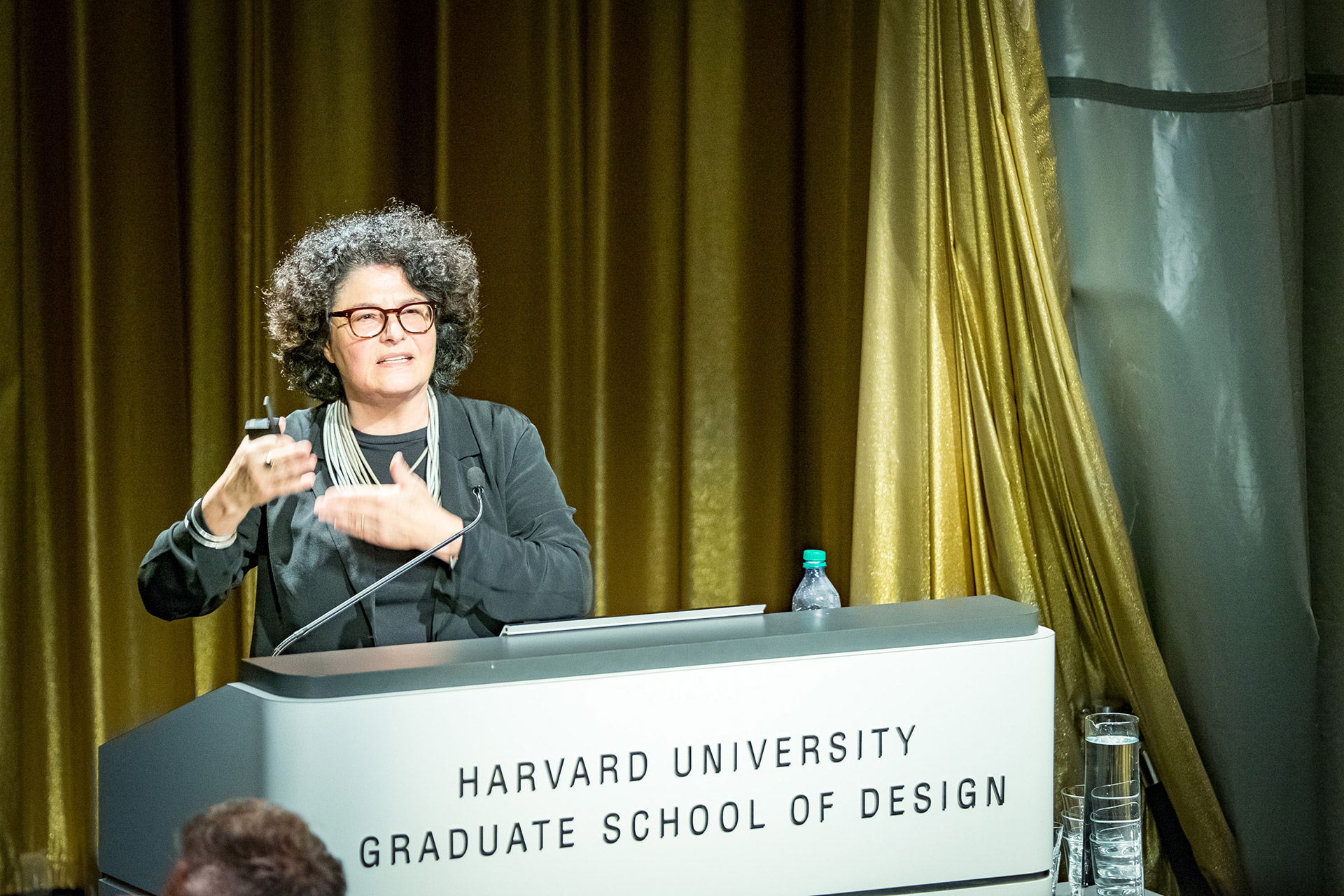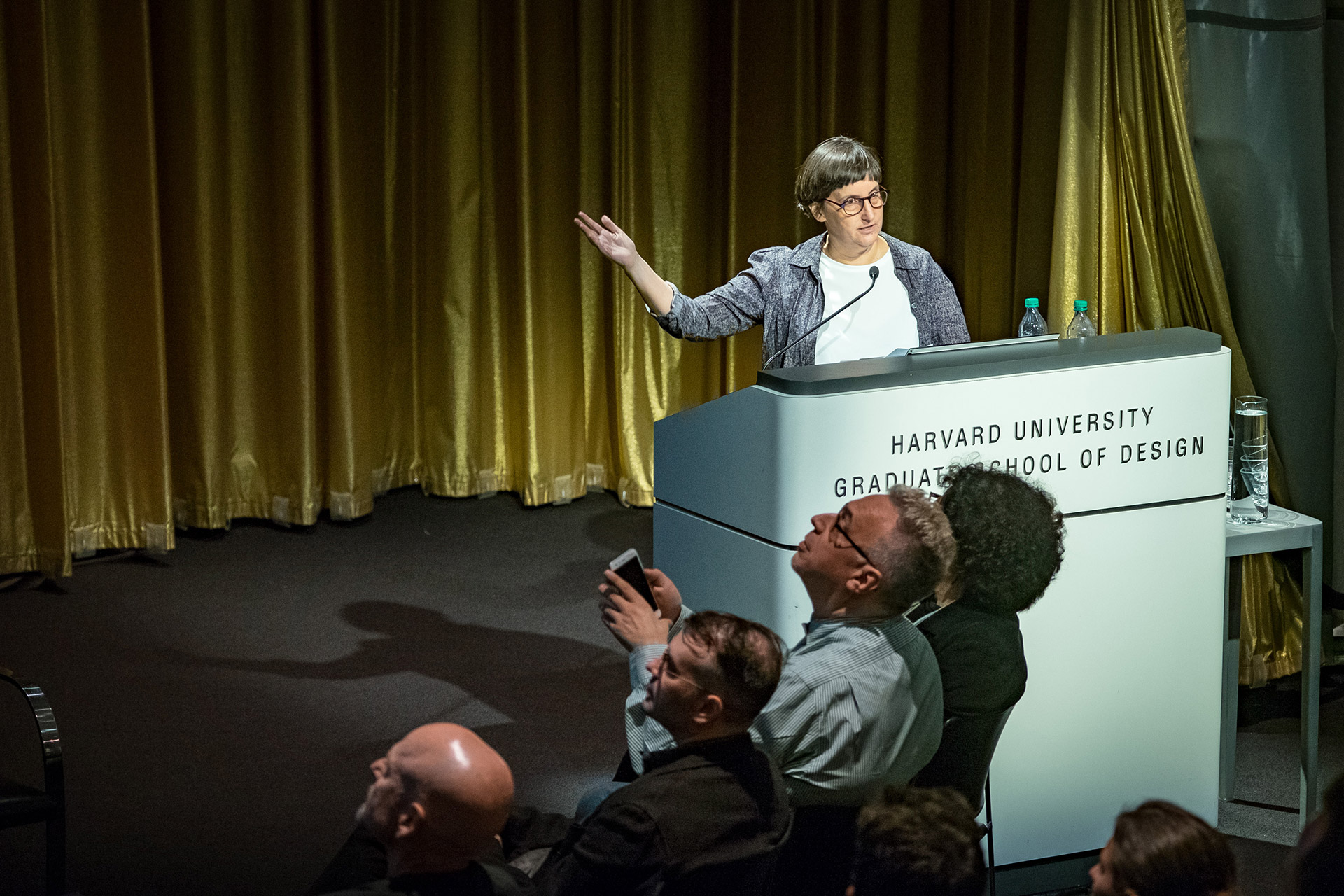URBAN INTERMEDIA: City, Archive, Narrative

Please join us for a conversation among the curators, Eve Blau and Robert Pietrusko, and invited media theorists, Laura Kurgan, Lev Manovich, and Jeffrey Schnapp about new methods of urban research that bring together design, scholarship, and critical media practice.
Focusing on Urban Intermedia: City, Archive, Narrative – the exhibition, research project, and methodological experiment currently on display in the Druker Design Gallery – the panel will explore a range of questions related to the use of archival materials and time-based media that were developed in the project: How are the materials and methods of urban research— and by extension the stories we tell with them—being transformed by new media formats and technologies? In this context, what constitutes an archive, and how might physical archival materials be incorporated into digital forms of urban scholarship? Is it possible to tell stories and construct arguments that speak across disciplinary boundaries through a shared media language? And, how would such a “shared media language” challenge the dominant conceptual frameworks of urban research?
The panel discussion will be immediately followed by a reception in the Druker Design Gallery for the exhibition Urban Intermedia: City, Archive, Narrative.
HARVARD-MELLON URBAN INITIATIVE is a multiyear cross-Harvard research and teaching project supported by funding from the Andrew W. Mellon Foundation. It brings together scholars and designers to develop new visual and digital methods and cross-disciplinary approaches to the study of urban environments, societies, and cultures. Four city-based research projects in Berlin, Boston, Istanbul, and Mumbai, along with related courses and programming, form the core of the project. Urban Intermedia: City, Archive, Narrative, the capstone project of the Initiative, presents the findings of the research and the media-rich methods of exploring the disciplinary ‘blind spots’ of urban research developed in the project.
For more information, please visit the Harvard Mellon Urban Initiative.
Co-Principal Investigators:
Eve Blau, Adjunct Professor of the History and Theory of Urban Form, GSD
Julie Buckler, Samuel Hazzard Cross Professor of Slavic Languages and Literatures, FAS
Participant Bios
Eve Blau teaches the History and Theory of Urban Form in the Department of Urban Planning and Design and is Co-Principal Investigator of the Harvard Mellon Urban Initiative. She has written extensively on modern architecture and urbanism and curated numerous exhibitions. Her research engages a range of issues in urban and architectural history and theory and the productive intersection of urbanism and media. A major concern is with the dynamics of urban transformation with a particular focus on post-socialist and post-industrial urban conditions. Her books include Baku: Oil and Urbanism (2018); Project Zagreb: Transition as Condition, Strategy, Practice (2007); The Architecture of Red Vienna 1919-1934 / Rotes Wien: Architektur 1919-1934. Stadt-Raum-Politik (2014/1999); Shaping the Great City: Modern Architecture in Central Europe (2000); Architecture and Cubism (2001/1997); Architecture and Its Image: Four Centuries of Architectural Representation (1989). Her publications have received numerous awards including the Victor Adler State Prize of the Republic of Austria, the Alice Davis Hitchcock, Spiro Kostof, and the Exhibition Catalogue Awards of the Society of Architectural Historians. Before coming to Harvard, Blau was Curator of Exhibitions and Publications at the Canadian Centre for Architecture in Montreal; she continues to be involved with the CCA and with curatorial projects.
Laura Kurgan is an Associate Professor of Architecture at the Graduate School of Architecture Planning and Preservation at Columbia University, where she directs the Visual Studies curriculum, and the Center for Spatial Research. She is the author of Close Up at a Distance: Mapping, Technology, and Politics (Zone Books, 2013). Her work explores things ranging from digital mapping technologies to the ethics and politics of mapping, and the art, science and visualization of data. Her work has appeared at the Cartier Foundation in Paris, the Venice Architecture Biennale, the Whitney Altria, MACBa Barcelona, the ZKM in Karlsruhe, and the Museum of Modern Art. She was the winner of the United States Artists Rockefeller Fellowship in 2009.
Dr. Lev Manovich is one the leading theorists of digital culture worldwide, and a pioneer in application of data science for analysis of contemporary culture. Manovich is the author and editor of 13 books including AI Aesthetics (forthcoming 2018), Theories of Software Culture, Instagram and Contemporary Image, Data Drift, Software Takes Command, Soft Cinema: Navigating the Database and The Language of New Media which was described as “the most suggestive and broad ranging media history since Marshall McLuhan.” He was included in the list of “25 People Shaping the Future of Design” in 2013 and the list of “50 Most Interesting People Building the Future” in 2014. Manovich is a Professor of Computer Science at The Graduate Center, CUNY, and a Director of the Cultural Analytics Lab that pioneered analysis of visual culture using computational methods. The lab created projects for Museum of Modern Art (NYC), New York Public Library, Google and other clients. He also teaches at European Graduate School (EGS), Strelka Institute for Media, Architecture and Design in Moscow.
Robert Gerard Pietrusko is an Associate Professor in the department of Landscape Architecture, where his teaching and research focuses on geospatial representation, simulation, narrative + critical cartography, and spatial taxonomies. Pietrusko is also a co-founder of the metaLAB(at)Harvard, where he develops data-rich tools and environments for the communication of scholarly work. His design work has been exhibited at the MoMA, SFMOMA, The Foundation Cartier, and the Venice Architecture Biennale, among others, and has been featured in Metropolis, Architectural Record, and Domus. In 2011, he was an artist-in-residence at the ZKM Center for Art and Media in Karlsruhe, Germany, and at the Experimental Media and Performing Arts Center (EMPAC) in Troy, NY. Prior to joining the junior faculty of the GSD, Pietrusko worked as a designer with Diller Scofidio + Renfro in New York, and held research positions at Parsons Institute for Information Mapping at the New School and at Columbia University’s Spatial Information Design Lab. Pietrusko holds a Bachelor of Music in Music Synthesis from the Berklee College of Music; a Master of Science in Electrical Engineering from Villanova University; and a Master of Architecture (with distinction) from the Graduate School of Design at Harvard University.
Jeffrey Schnapp is the faculty director of metaLAB (at) Harvard and co-director of the Berkman Klein Center for Internet and Society at Harvard University, where he holds the Carl A. Pescosolido Chair in Romance Languages and Literatures and Comparative Literature. His recent publications include The Electric Information Age Book ([Princeton Architectural Press 2012]); Modernitalia (Peter Lang 2012); The Library Beyond the Book (Harvard 2014); Digital Humanities (Egea 2015); and FuturPiaggio. Six Italian Lessons on Mobility and Modern Life(Rizzoli 2017). He is co-founder and Chief Visionary Officer at Piaggio Fast Forward, a Boston-based robotics subsidiary of the Milan-based Piaggio Group, known throughout the world for iconic vehicles like the Vespa and iconic brands like Aprilia and Moto Guzzi.
Harvard University welcomes individuals with disabilities to participate in its programs and activities. If you would like to request accommodations or have questions about the physical access provided, please contact the Public Programs Office at (617) 496-2414 or [email protected] in advance of your participation or visit. Requests for American Sign Language interpreters and/or CART providers should be made at least two weeks in advance. Please note that the University will make every effort to secure services, but that services are subject to availability.
#GSDEVENTS


